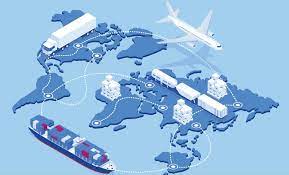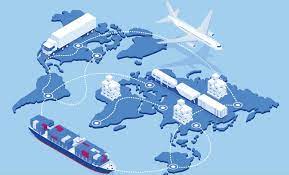
A combination of events in recent months has upended the global supply chains towards breaking point which include a fresh surge of Covid-19 throughout the world, heavy rains leading to severe disasters in China and Germany and a crippling cyber attack that targeted some of the crucial ports of South Africa.
A combination of such events has threatened the flow of raw materials parts and consumer goods, say companies, economists and shipping specialists.
Parts of Asia have been devastated by the Delta variant of the coronavirus and prompted governments to deny land access to sailors. That has resulted in shipping companies being unable to rotate tired and sea weary crews with more than 100,000 seafarers stranded at sea even after completion of their stints, something that was seen in 2020 during the height of the first wave of the pandemic.
"We're no longer on the cusp of a second crew change crisis, we're in one," Guy Platten, secretary general of the International Chamber of Shipping, said in an interview to the news agency Reuters. "This is a perilous moment for global supply chains."
The supply of everything from oil and iron ore to food and electronics is being disrupted by the crew crisis because about 90 per cent of the world's trade is done on ships.
The situation was described as "extremely challenging" by German container line Hapag Lloyd. "Vessel capacity is very tight, empty containers are scarce and the operational situation at certain ports and terminals is not really improving," it said. "We expect this to last probably into the fourth quarter – but it is very difficult to predict."
The global supply chains, yet to recover from the pandemic-induced disruption, have been further hit by deadly floods in economic powerhouses of China and Germany.
According to the Chinese state planner, transportation of coal from mining regions such as Inner Mongolia and Shanxi in China has been affected by the flooding in the country, even while more fuel is required by power plants to meet peak summer demand.
There has also been a significant slowdown in road transportation of goods in Germany because of flooding. The volume of late shipments increased by 15 per cent in the week of July 11 compared to the previous weeks because of the flooding in the country, showed data from supply-chain tracking platform FourKites.
Companies were struggling to get hold of goods stacked up in Asia and in US ports because of a combination of crises, said Nick Klein, VP for sales and marketing in the Midwest with Taiwan freight and logistics company OEC Group.
"It's not going to clear up until March," Klein said.
While the hit to the auto industry, already reeling from a global shortage of chips, worsened further with delays in shipments of parts.
Warnings of a further worsening of component supply problems was issued by Electrolux, Europe's biggest home appliances maker, this week, and could further aggravate production issues of the company.
The delivery of equipment needed to build stores was being affected by the supply-chain disruptions, said Domino's Pizza.
"Short-term capacity issues remain a concern, constraining output in many manufacturing and service sector companies while simultaneously pushing prices higher as demand exceeds supply," said Chris Williamson, chief business economist at IHS Markit.
(Source:www.smh.com.au)
A combination of such events has threatened the flow of raw materials parts and consumer goods, say companies, economists and shipping specialists.
Parts of Asia have been devastated by the Delta variant of the coronavirus and prompted governments to deny land access to sailors. That has resulted in shipping companies being unable to rotate tired and sea weary crews with more than 100,000 seafarers stranded at sea even after completion of their stints, something that was seen in 2020 during the height of the first wave of the pandemic.
"We're no longer on the cusp of a second crew change crisis, we're in one," Guy Platten, secretary general of the International Chamber of Shipping, said in an interview to the news agency Reuters. "This is a perilous moment for global supply chains."
The supply of everything from oil and iron ore to food and electronics is being disrupted by the crew crisis because about 90 per cent of the world's trade is done on ships.
The situation was described as "extremely challenging" by German container line Hapag Lloyd. "Vessel capacity is very tight, empty containers are scarce and the operational situation at certain ports and terminals is not really improving," it said. "We expect this to last probably into the fourth quarter – but it is very difficult to predict."
The global supply chains, yet to recover from the pandemic-induced disruption, have been further hit by deadly floods in economic powerhouses of China and Germany.
According to the Chinese state planner, transportation of coal from mining regions such as Inner Mongolia and Shanxi in China has been affected by the flooding in the country, even while more fuel is required by power plants to meet peak summer demand.
There has also been a significant slowdown in road transportation of goods in Germany because of flooding. The volume of late shipments increased by 15 per cent in the week of July 11 compared to the previous weeks because of the flooding in the country, showed data from supply-chain tracking platform FourKites.
Companies were struggling to get hold of goods stacked up in Asia and in US ports because of a combination of crises, said Nick Klein, VP for sales and marketing in the Midwest with Taiwan freight and logistics company OEC Group.
"It's not going to clear up until March," Klein said.
While the hit to the auto industry, already reeling from a global shortage of chips, worsened further with delays in shipments of parts.
Warnings of a further worsening of component supply problems was issued by Electrolux, Europe's biggest home appliances maker, this week, and could further aggravate production issues of the company.
The delivery of equipment needed to build stores was being affected by the supply-chain disruptions, said Domino's Pizza.
"Short-term capacity issues remain a concern, constraining output in many manufacturing and service sector companies while simultaneously pushing prices higher as demand exceeds supply," said Chris Williamson, chief business economist at IHS Markit.
(Source:www.smh.com.au)





